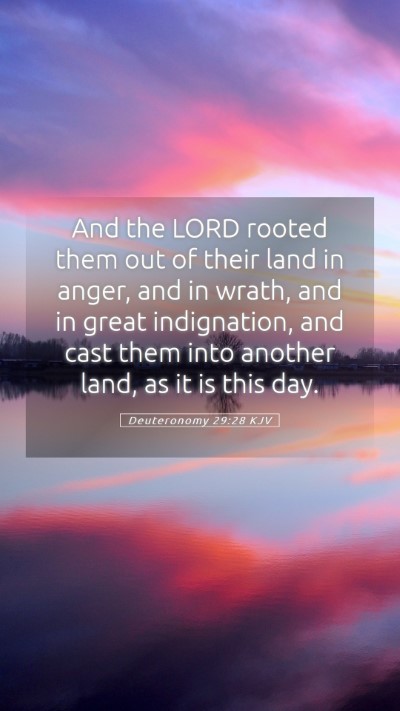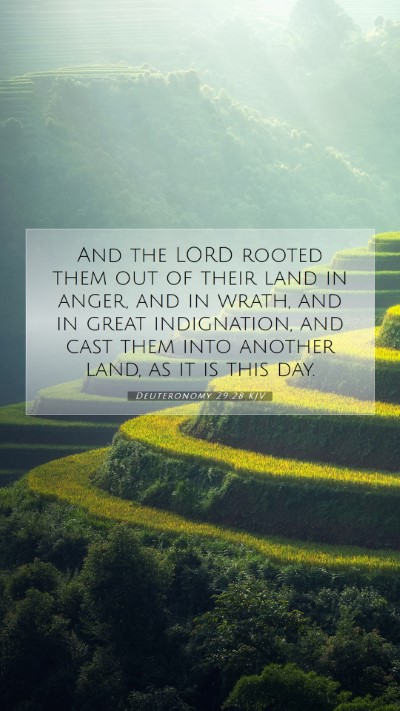Understanding Deuteronomy 29:28: A Comprehensive Commentary
Deuteronomy 29:28 states: "And the Lord rooted them out of their land in anger, and in wrath, and in great indignation, and cast them into another land, as it is this day." This verse carries profound implications regarding God's covenant with His people and His responses to disobedience.
Verse Meaning and Context
This passage comes at a pivotal moment in the Book of Deuteronomy, where Moses, nearing the end of his life, reiterates God's laws to the Israelites and warns them of the consequences of turning away from Him.
Key Themes:
- Divine Judgment: The verse highlights God's righteous anger and the consequences of infidelity to His covenant.
- Exile and Restoration: The reference to being cast into another land foreshadows the Babylonian exile, a recurring theme in the Old Testament.
- God's Sovereignty: It emphasizes God's authority over nations and His ultimate control over history.
Insights from Commentators
Various commentators provide rich insights into the meaning of this verse:
Matthew Henry:
Matthew Henry points out that the Israelites' disobedience would lead to their expulsion from the land God promised them. He emphasizes the severity of God's wrath and the certainty of His judgments against sin. According to Henry, the punishment serves as a reminder of God's holiness and the serious consequences of failing to uphold His commandments.
Albert Barnes:
Albert Barnes notes that this verse serves as a prophetic declaration concerning the fate of Israel if they break the covenant. He emphasizes the role of divine justice, pointing out that their rejection of God's laws would result in losing their inheritance. Barnes highlights the concept of sin leading to national catastrophe, invoking historical contexts where such actions historically occurred.
Adam Clarke:
Adam Clarke elaborates on the specific historical contexts in which this verse was applicable, particularly the Babylonian captivity that awaited Israel due to their infidelity. Clarke cautions that such judgments are not random but stem from a direct consequence of the people's actions against God's will. He points out the importance of heeding warnings about disobedience to avoid similar fates.
Application of the Verse
For modern readers, the verse serves as a reminder of the need for faithfulness and obedience to God. The historical context provides a powerful lesson on the long-term effects of turning away from divine guidance. Individuals and communities today can reflect on how they choose to live in alignment with God's principles.
Cross References
This verse relates to several key passages in the Bible:
- Jeremiah 25:11-12: Discusses the Babylonian captivity.
- 2 Chronicles 36:15-21: Details the consequences of Israel's disobedience.
- Deuteronomy 28:15-68: Lists the curses for disobedience.
Conclusion
In summary, Deuteronomy 29:28 encapsulates vital lessons about obedience, divine judgment, and national consequences within the broader narrative of Israel's relationship with God. By studying this verse through various commentaries, believers can deepen their understanding of God's character and the importance of faithfulness in their own lives.
Further Bible Study Resources
For those engaged in Bible study groups or seeking online Bible study tools, exploring the meanings and interpretations of difficult passages can enhance collective understanding of Scripture. Consider utilizing Bible study guides and lessons focused on Old Testament narratives for deeper insights.


